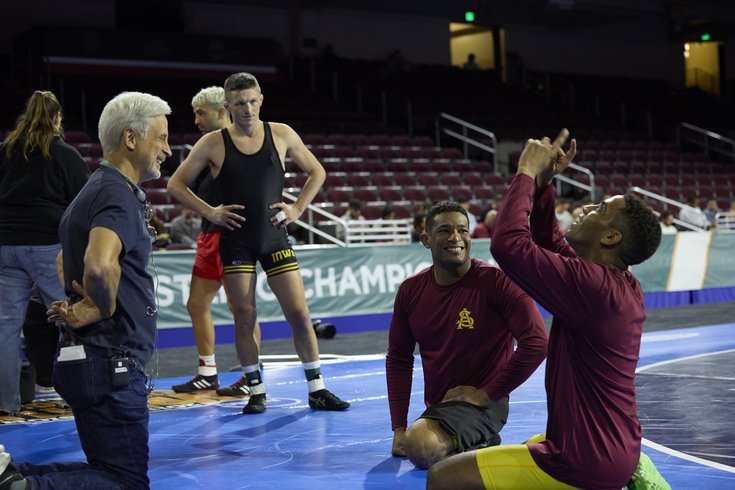
October 25, 2024
 Provided image/Amazon MGM Studios
Provided image/Amazon MGM Studios
Philadelphia native William Goldenberg (left) directs the upcoming wrestling movie 'Unstoppable.' The movie stars Jharrel Jerome (far right) as NCAA champion wrestler Anthony Robles (right).
William Goldenberg is no stranger to show business.
The Philadelphia native has been editing films since the 1980s, splicing together an impressive resume that includes "Heat," "The Insider," "Seabiscuit" and "Gone Baby Gone." He even competed against himself at the 2013 Oscars, when he received dual nominations for editing "Zero Dark Thirty" and "Argo." (He won for the latter.)
But he's stepping into a new role with the upcoming wrestling biopic "Unstoppable." The Amazon movie, which hits select theaters in December ahead of its Prime debut, marks Goldenberg's directorial debut.
"I felt like I had a choice between being petrified or just doing it," he said Thursday, after the movie's screening at the Philadelphia Film Festival. "And I just didn't want to be petrified."
His film's subject could undoubtedly relate. "Unstoppable" tells the true story of Anthony Robles, a young man born with one leg who went on to win the 2011 NCAA wrestling championship. The film stars Jharrel Jerome as Robles, with supporting turns from Don Cheadle, Michael Peña and Bobby Cannavale. Jennifer Lopez plays Robles' mother Judy, an unwavering source of support dealing with significant challenges of her own. She bears the brunt of her husband's abuse, and later fights the family's eviction by a predatory lender.
"I hadn't seen a sports movie that was a story about a mother and son," Goldenberg said. "Originally, the movie was much more about the coach – Coach Williams, his high school coach – being like a father figure to him. Which he was. But I just thought, I've seen that movie, and the real important relationship in Anthony's life is his mom. I mean, his mom had him when she was 15, so they grew up together and they parented each other.
"I thought, well, that's way more interesting to me than what I've seen before."
Goldenberg admits that wrestling wasn't his sport growing up in Philly. It was ice hockey, which he played through his years at Northeast High School and Temple University. But his hours in locker rooms and general love of sports movies lent him a degree of familiarity with the world. As he binged wrestling matches on YouTube – including all of Robles' meets – he grew to appreciate the players' spirit.
"It's an exceptional sport in terms of the way the wrestlers from any team, the way they treat each other," Goldenberg said. "There's no s***-talking and there's no one-upsmanship. They wrestle almost it seems like to the death at a certain point. But afterwards, they're like, shake hands, everything's cool. They're all in the big wrestling family, and they treat each other that way."
To recreate that world, Goldenberg leaned heavily on his subject. While Jerome, who spent five years preparing for the role with wrestling trainers and movement coaches, did each of the wrestling sequences in the film, so did Robles. Goldenberg and his editor, Brett M. Reed, sifted through the different takes and wove them together, digitally imposing Jerome's face on Robles' body where needed.
Goldenberg decided to shoot the entire movie with handheld cameras to avoid the "shiny, glossy feel" of some sports films. His crew also built an 8-by-4-foot glass platform so the cinematographers could film the wrestling not just from above, but below. Robles was on set most days, available to double for Jerome or tweak the wrestling choreography with the film's coordinator, Brian Stith.
"A lot of attention was paid to make sure we did it as authentically as possible," Goldenberg said at a film festival Q&A on Wednesday.
The newly minted director didn't grow up dreaming of a career in Hollywood. When he wasn't in school or playing hockey, he was "working (his) ass off" in his father's deli on Fifth Street between Pine and Spruce. He knew how to put in the hours, but he wasn't sure what he wanted to do with his life. It wasn't until he enrolled at Temple — and took a class in experimental filmmaking — this his path clicked into place. Kind words from a professor helped push him along.
"It was the first time anybody had ever really encouraged me that way," Goldenberg said. "We weren't in a really artistic family. Like my kids now, they've been exposed to everything, but I wasn't exposed to that much. I was sort of late to the table."
That feeling of arriving late to the party has chased the editor through much of his critically acclaimed career. As he turns to the director's chair, it's stayed with him, but observing respected directors like Michael Mann, Kathryn Bigelow and Ben Affleck up close helped him through the discomfort.
"It sounds corny, but I feel like I had them all with me in a way, because of how much I've learned from them," Goldenberg said. "It's a weird thing to start directing at this point in my career. But I didn't feel like I was ready for it. Now I'm so happy that I did it this way. Because it was so much more gratifying to do with all that in my head."
Follow Kristin & PhillyVoice on Twitter: @kristin_hunt
| @thePhillyVoice
Like us on Facebook: PhillyVoice
Have a news tip? Let us know.